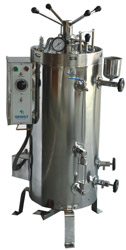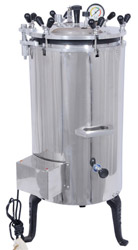Trade Mark No.: 2022609
Vertical Autoclave | Top Loading Sterilizers (22 to 175 liters)


Vertical autoclave, also known as steam sterilizers and top loading sterilizers, is a sterilizing machine that comes in a cylindrical shape. These machines help in sterilization of medical equipment, surgical instruments to name a few. Sterilization is one of the key medical processes in many industries including food and healthcare. This machine works on the principle of high-pressure steam for sterilizing flasks, medical tools, beakers, etc. Based on the industry and usage, these machines are available in different designs such as Double Wall Construction, Triple Wall and GMP construction.
We are ISO & CE Certified Vertical Autoclave Manufacturers in India. Standard models of Vertical autoclave units manufactured by Bionics Scientific in India are available with chamber volumes of 22 liters to 175 liters that accommodate two and three drums accordingly. These systems are designed for meeting effective sterilization requirements in bacteriological and research laboratories, hospitals and clinics and food and beverage units. The vertical chamber design maximizes space utilization, while microprocessor control system enables comfortable working all the time you operate the machine.
Also called vertical steam sterilizers, our vertical type autoclaves deliver flexible solutions of steam sterilization in hospitals, clinics and other areas of application, where reliable steam sterilization is a mandatory process. Vertically designed chamber provides guaranty of safe and efficient sterilization even in confined spaces. In order to suit specific application, these units are fabricated as fully GMP stainless steel double and triple walled construction; in addition, we also manufacture Custom vertical autoclaves in India with other configurations, which include stainless steel inner and exterior made of Mild Steel (MS).
The most important feature that keeps our range of vertical autoclaves top of others is meeting all relevant guidelines and standards such as NABH standards. As an option, we also provide IQ / OQ / PQ calibration documentation with extra cost. These systems are fully customizable and provided with large scope of customization; to meet individual budget, we can equipment your vertical autoclave with a number of optional accessories such as temperature chart recorder, digital temperature indicator, PID Controller and provision to attach a dot matrix printer.
Features:
| Tank volume 20 to 175 liters | Equipped with joint less silicon rubber gasket |
| Provided with immersion type heater | Double, triple wall & GMP construction |
| Comply with NABL standards | Radial or wing nut type door locking |
| Supply with drums (extra cost) | Water level indicator |
| Easy operation and low maintenance | Digital temperature indicator |
| IQ / OQ / PQ Documentation | Temperature chart recorder |
| Provision to attach dot matrix printer | USB interface for data transfer |
Specifications:
| Model | BST/VA-22 | BST/VA-40 | BST/VA-50 | BST/VA-95 | BST/VA-175 |
|---|---|---|---|---|---|
| Internal Tank Capacity | 22 Liter | 40 Liter | 50 Liter | 95 Liter | 175 Liter |
| Load | 2.00 KW | 3.00 KW | 3.00 KW | 4.00 KW | 6.00 KW |
| Chamber dimension | 10” x 18” | 12” x 22” | 14” x 22” | 18” x 24” | 22” x 36” |
| No.of Drums & Sizes | - | 2 (9” x11”) | 2 (9” x11”) | 2 (12” x 15”) | 3 (12” x 15”) |
| Working Pressure | 1.2 kgf/cm sq.g (15 psi - 17 psi) (Can be Upgraded up to 30 PSI) | ||||
| Sterilizing Temperature | 121°C to 134°C (150°C - Optional) | ||||
| Heat Average | <=±1°C | ||||
| Sterilization Time | 25 to 30 Minutes | ||||
| Digital Timer | 0 to 99 min | ||||
| Construction | Double / Triple wall & SS GMP construction | ||||
| Outer Chamber | Mild Steel (304 stainless Steel – Optional) | ||||
| Inner Chamber | 304 SS (316 / 316L grades Stainless Steel – Optional) | ||||
| Insulation | Glass Wool | ||||
| Waste Container | Stainless Steel | ||||
| Door / Lid | Foot lifted with safety and interlock device | ||||
| Door Locking type | Radial Type (Wing Nut Optional) | ||||
| Water Filling & Removal | Manual | ||||
| Safety Features | Radial locking, safety valve, low water detector and pressure interlock | ||||
| Optional accessories |
- PID controller - Low / High water cut-off device - Digital alarm - Temperature chart recorder - Dot Matrix Printer - RS 232 / USB PC Connection Port - NABL certification - Stainless Steel wire mesh carrier - Dressing drum - Sterilization indicator tape - Autoclave bags - PLC control system - IQ / OQ / PQ Documentation |
||||
| Power Supply | 220 Volts / 440 Volts | ||||
How Does Vertical Autoclave Work?
The vertical autoclave works on the principle of high-pressure for sterilizing equipment and medical tools. The primary function of top loading or vertical autoclaves is to generate steam for creating pressure and building up heat. The formation of heat helps in sterilizing medical tools like flasks, beakers, etc., and makes them free from viruses, bacteria, and other microorganisms.
Components of Vertical Autoclave
An autoclave comprises numerous parts. Some parts are standard whereas some are optional. The standard fittings of a vertical autoclave comprise automatic pressure switch, pedal lifting device, steam release valve, water outlet valve, low water indicator, safety valve, heating lamp, etc. Regardless of the type and construction of an autoclave, these parts are present and perform individual function. Some companies demand for additional accessories with vertical autoclaves. These accessories include thermal printer, lower water cut-off, dressing drum, autoclave bags and PLC Control system. In healthcare, food industries and many other industries, both horizontal and vertical autoclaves are used. However, these two machines perform the similar function but have certain distinguished features.
Difference between Horizontal & Vertical Autoclaves
Some of the main differences between horizontal and vertical autoclave are as follows:
- 1.The vertical autoclaves have small volume capacity as compared to horizontal autoclaves.
- 2.In vertical autoclaves, the opening and closing of an autoclave door is both time and labor-intensive process whereas, in horizontal autoclaves, the process is easy to perform with a turn of a steering wheel.
- 3.Sterilizing canned food in any packing in vertical autoclaves requires more effort whereas one can easily sterilize even canned food in horizontal machines by making adjustments of pressure.
- 4.Unlike horizontal autoclaves, the labor-intensive process of unloading and loading gaskets is difficult to automate.
- 5.The installation process of vertical autoclaves requires certification and supervision due to which installation process takes more time as compared to the installation of the horizontal autoclaves.
- Email Us: Info@bionicsscientific.com
- Call Us: +91 9818134577 | +91 9810971600
